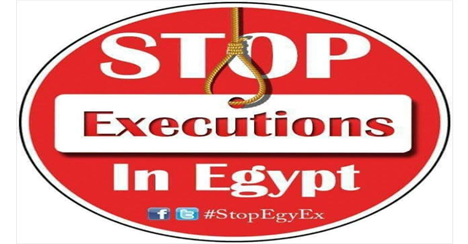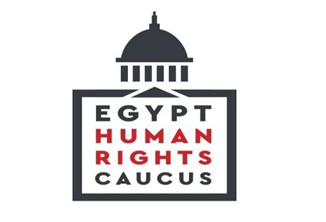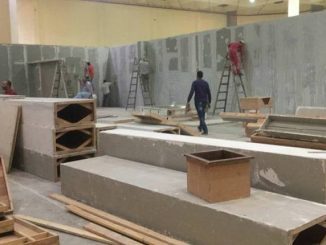
Following execution of 7 people by Egyptian authorities last week, eight human rights organizations have urged the government to stop implementing the death penalty in the country
The eight Egyptian human rights organizations on March 13 came together to urge the government to stop implementation of the death penalty, particularly in light of the “flawed judicial processes involved”.
The organizations, including the Egyptian Initiative for Personal Rights and the Cairo Institute for Human Rights Studies, noted that last week’s executions followed “trials in which the defendants were forcibly disappeared, tortured, and denied their fundamental rights, including their right to a lawyer.”
The regime’s “National Strategy for Human Rights,” announced last September, professes a commitment to fair trials, extra scrutiny for cases involving the death penalty, and the humane treatment of detainees, including by “combating torture in all its forms, investigating torture-related allegations, and protecting the rights of victims under all circumstances.
” By contradicting all of these commitments in last week’s executions, the organizations wrote, the regime confirmed that its strategy is “nothing more than a ploy … to whitewash its image before the international community.”
Further Repression
It is to be mentioned that 21 rights organizations, including the Egyptian Commission for Rights and Freedoms, Egyptian Front for Human Rights (EFHR), Egyptian Human Rights Forum (EHRF), and the Egyptian Initiative for Personal Rights (EIPR) have recently called upon Egyptian authorities to end arbitrary detention of activists and opponents.
Twelve Egyptian activists have been on hunger strike since early February 2022 in protest of their prolonged pre-trial detention at Tora Prison Complex.
Among those activists are: Abdelrahman Tarek (Moka), Ahmed Maher (Rigo), Galal El Beheriy, and Walid Shawky who started hunger strikes to protest their unlawful imprisonment. However, on 8 March, Walid Shawky ended his hunger strike.
Their health is at risk as their physical condition further deteriorates.
The rights organisations that signed the statement called on the Egyptian authorities to immediately and unconditionally release the aforementioned individuals, as well as all of the many other individuals currently held in detention for peacefully exercising their right to free expression.
Ahmed Maher (Rigo) has been in pre-trial detention since May 2020 on charges of joining a terrorist group, publishing false news and misuse of social media. The court ordered his release under Case no. 586/2020 in October 2020, however, the State Security Prosecution ordered his detention over the same charges under another case, Case no. 885/2020.
Abdelrahman Tarek (Moka) served a three-year prison sentence followed by probation after participating in a protest against military trials for civilians in August 2013. He was arrested again in September 2019 on accusations of joining a terrorist group and has been in pre-trial detention since. In March 2020, the court ordered his release and the replacement of his pre-trial detention with probation measures.
However, in April 2020, he was rotated under a different case number with the same charges. In September 2020, the Criminal Court ordered his release, but this decision was never implemented. He was subsequently forcibly disappeared for more than 60 days and later reappeared. He was then charged under a third case with the same charges, Case no.1056/2020. In late 2020, he began a 53-day hunger strike, also in protest of his prolonged detention without trial. He concluded the strike on 4 February 2021 due to his deteriorating health and pressure exerted by prison authorities.
Galal El Beheriy was arrested on 3 March 2018 and disappeared for a week before reappearing to charges of terrorist affiliation, disseminating false news, abusing social media networks, blasphemy, contempt of religion, and insulting the military. He was subjected to torture and beating during his disappearance.
On 31 July 2018, he was sentenced to three years in prison, including a fine of 10,000 L.E. for his poetry, on charges of insulting the military and spreading false news.
Security forces arrested Dr. Walid Shawky from his clinic in Cairo on 14 October 2018. Thereafter, he was forcibly disappeared for six days. Shawky later appeared at the State Security Prosecution and was accused of joining a terrorist group and publishing false news in Case no. 621/2018.
In August 2020, the Criminal Court released him under this case. However, the State Security Prosecution subsequently ordered Shawky’s detention over the same charges under another case, Case no. 880/2020.
The UN Working Group on Arbitrary Detention highlighted “a systemic problem with arbitrary detention in Egypt”, adding that “under certain circumstances, widespread or systematic imprisonment or other severe deprivation of liberty in violation of the rules of international law could constitute crimes against humanity.”
There are tens of thousands of individuals arbitrarily detained in Egypt including activists, political figures, journalists, students, lawyers, staff of civil society organizations, human rights defenders (HRD) including women human rights defenders (WHRD), family members of political opponents and human rights defenders whose place of residence is abroad, women social media influencers, as well as individuals voicing criticism to political, economic or social conditions. The following individuals are among those in arbitrary detention; some have been sentenced while the majority are in pre-trial detention, including:
Abdel Moneim Aboul-Fotouh (politician), Abdel Rahman Tarek Mokka (HRD), Ahmed Allam (journalist), Ahmed Amasha (veterinarian, environmental activist, HRD and trade unionist),Ahmed Badawy, Ahmed Douma (activist and writer), sentenced by Criminal Court, Ahmed Maher (Rigo), Ahmed Sebei (journalist), Ahmed Mohy, Ahmed Samir, Santawi, sentenced by Emergency State Security Court, Ahmed Tammam (HRD), Aisha El Shater (WHRD), Alaa Abdel Fattah (HRD and blogger), sentenced by Emergency State Security Court, Alaa Essam (HRD), Amr Imam (HRD and lawyer), Anas al-Beltagy, Amr Nohan (HRD and lawyer), Ayman Abdel Moaaty (researcher), Azoz Mahgoub (lawyer), Bahaa Eldin Ibrahim (journalist), Bader Mohamed (journalist), Dawlat Yehia, Ezzat Ghoneim (HRD and lawyer), Gaffer al-Zaafarani, sentenced by Criminal Court, and Galal El Beheriy (poet), sentenced by military court.
Among those that are exposed to pre-trial detention are Haytham Mohammadein (HRD and lawyer), Hamdy El-Zaime (journalist), Haneen Hossam (woman online-content creator), sentenced by Criminal Court, Hassan Barbari (HRD), Hassan Mostafa, Hisham Abdelaziz (journalist), Hisham Fouad (journalist), sentenced by Emergency State Security Court, Houssam Moanis (journalist), sentenced by Emergency State Security Court, Hoda Abdel Moneim (WHRD and lawyer), Hossam Khalaf, Hussein Khamis Mohammed Chabel, Ibrahim Ezz el-Din (HRD), Ibrahim Metwaly (HRD and lawyer), Ismail Alexandrani (journalist), sentenced by military court, Kholoud Saied Amer, Marwa Arafa , Moaatez AbdelWahab (producer), Mohamed Adel (HRD), Mohamed El Baqer (HRD and lawyer), sentenced by Emergency State Security Court, Mohammed al-Qassas (activist and politician) , Mohamed Ibrahim Radwan ‘Oxygen’ (HRD and journalist/blogger), sentenced by Emergency State Security Court, Mohamed Mohieldin, Mohamed Saied Fahmy (journalist), Mohamed Ramadan (HRD and lawyer), Mohamed Salah (journalist), Mostafa Gamal, Mawadda al-Adham (woman online-content creator), sentenced by Criminal Court, Nermeen Hussein (blogger), Omar El Shenety (economist), Radwa Mohamed Farid, Safwan Thabet, Salah Soltan, sentenced by Criminal Court, Seif Fateen (professor of engineering), Said Abdellah (journalist), Seif Thabet, Tawfiq Ghanem (journalist), Walid Shawky (dentist and activist), and Zyad El-Elaimy (human rights lawyer and politician), sentenced by Emergency State Security Court.
UN Special Procedures have raised serious concerns over inhumane prison conditions, including denial of family visits, lack of access to lawyers, and inadequate medical care leading or contributing to deaths in custody. They have urged Egypt to “promptly address its prison conditions and reverse what appears to be deeply entrenched practices that are severely infringing on people’s right to life, the right not to be subjected to arbitrary detention, the right not to be subjected to torture or ill-treatment, the right to due process and a fair trial, and adequate medical care.
” Women detainees face torture and gender-based violence in custody committed by authorities in complete impunity. UN Special Procedures and the CEDAW Committee have raised concerns about the lack of gender-specific measures that meet the needs of women detainees, the denial of access to facilities and materials required to meet women’s personal hygiene needs, the lack of redress mechanisms and accountability for victims of gender-based and sexual violence, the lack of medical care and unhygienic conditions in prisons, and the use of strip searches and prolonged solitary confinement as a punishment.
On 12 March 2021, 31 states at the UN Human Rights Council urged Egypt to end its persecution of activists, journalists and political opponents; called on Egypt to release them unconditionally; and urged the country to end the “the practice of adding detainees to new cases with similar charges after the legal limit for pre-trial detention has expired” (rotation). A year later, Egypt has failed to respond to these calls.
Echoing longstanding appeals from inside and outside of Egypt, the NGOs called for an immediate moratorium on executions in the country and a review of all cases carrying the death penalty.



